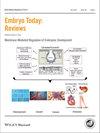Petya T. Koleva, Ji-Sun Kim, James A. Scott, Anita L. Kozyrskyj
下载PDF
{"title":"微生物对健康和疾病的规划始于胎儿时期","authors":"Petya T. Koleva, Ji-Sun Kim, James A. Scott, Anita L. Kozyrskyj","doi":"10.1002/bdrc.21117","DOIUrl":null,"url":null,"abstract":"<p>The pioneer microbiota of the neonatal gut are essential for gut maturation, and metabolic and immunologic programming. Recent research has shown that early bacterial colonization may impact the occurrence of disease later in life (microbial programming). Despite early conflicting evidence, it has long been considered that the womb is a sterile environment and human microbial colonization begins at birth. In the last few years, several findings have reiterated the presence of microbes in infant first stool (meconium) and pointed to the existence of in utero microbial colonization of the infant gut. The dominant bacterial taxa detected in meconium specimens belong to the <i>Enterobacteriaceae</i> family (<i>Escherichia</i> genus) and lactic acid bacteria (notably members of the genera <i>Leuconostoc</i>, <i>Enterococcus</i>, and <i>Lactococcus</i>). Maternal atopy promotes dominance of <i>Enterobacteriaceae</i> in newborn meconium, which in turn may lead to respiratory problems in the infant. This microbial interaction with the host immune system may in fact, originate during fetal life. Our review evaluates the evidence for an intrauterine origin of meconium microbiota, their composition and influences, and potential clinical implications on infant health. Birth Defects Research (Part C) 105:265–277, 2015. © 2015 Wiley Periodicals, Inc.</p>","PeriodicalId":55352,"journal":{"name":"Birth Defects Research Part C-Embryo Today-Reviews","volume":"105 4","pages":"265-277"},"PeriodicalIF":0.0000,"publicationDate":"2015-12-10","publicationTypes":"Journal Article","fieldsOfStudy":null,"isOpenAccess":false,"openAccessPdf":"https://sci-hub-pdf.com/10.1002/bdrc.21117","citationCount":"102","resultStr":"{\"title\":\"Microbial programming of health and disease starts during fetal life\",\"authors\":\"Petya T. Koleva, Ji-Sun Kim, James A. Scott, Anita L. Kozyrskyj\",\"doi\":\"10.1002/bdrc.21117\",\"DOIUrl\":null,\"url\":null,\"abstract\":\"<p>The pioneer microbiota of the neonatal gut are essential for gut maturation, and metabolic and immunologic programming. Recent research has shown that early bacterial colonization may impact the occurrence of disease later in life (microbial programming). Despite early conflicting evidence, it has long been considered that the womb is a sterile environment and human microbial colonization begins at birth. In the last few years, several findings have reiterated the presence of microbes in infant first stool (meconium) and pointed to the existence of in utero microbial colonization of the infant gut. The dominant bacterial taxa detected in meconium specimens belong to the <i>Enterobacteriaceae</i> family (<i>Escherichia</i> genus) and lactic acid bacteria (notably members of the genera <i>Leuconostoc</i>, <i>Enterococcus</i>, and <i>Lactococcus</i>). Maternal atopy promotes dominance of <i>Enterobacteriaceae</i> in newborn meconium, which in turn may lead to respiratory problems in the infant. This microbial interaction with the host immune system may in fact, originate during fetal life. Our review evaluates the evidence for an intrauterine origin of meconium microbiota, their composition and influences, and potential clinical implications on infant health. Birth Defects Research (Part C) 105:265–277, 2015. © 2015 Wiley Periodicals, Inc.</p>\",\"PeriodicalId\":55352,\"journal\":{\"name\":\"Birth Defects Research Part C-Embryo Today-Reviews\",\"volume\":\"105 4\",\"pages\":\"265-277\"},\"PeriodicalIF\":0.0000,\"publicationDate\":\"2015-12-10\",\"publicationTypes\":\"Journal Article\",\"fieldsOfStudy\":null,\"isOpenAccess\":false,\"openAccessPdf\":\"https://sci-hub-pdf.com/10.1002/bdrc.21117\",\"citationCount\":\"102\",\"resultStr\":null,\"platform\":\"Semanticscholar\",\"paperid\":null,\"PeriodicalName\":\"Birth Defects Research Part C-Embryo Today-Reviews\",\"FirstCategoryId\":\"1085\",\"ListUrlMain\":\"https://onlinelibrary.wiley.com/doi/10.1002/bdrc.21117\",\"RegionNum\":0,\"RegionCategory\":null,\"ArticlePicture\":[],\"TitleCN\":null,\"AbstractTextCN\":null,\"PMCID\":null,\"EPubDate\":\"\",\"PubModel\":\"\",\"JCR\":\"Q\",\"JCRName\":\"Medicine\",\"Score\":null,\"Total\":0}","platform":"Semanticscholar","paperid":null,"PeriodicalName":"Birth Defects Research Part C-Embryo Today-Reviews","FirstCategoryId":"1085","ListUrlMain":"https://onlinelibrary.wiley.com/doi/10.1002/bdrc.21117","RegionNum":0,"RegionCategory":null,"ArticlePicture":[],"TitleCN":null,"AbstractTextCN":null,"PMCID":null,"EPubDate":"","PubModel":"","JCR":"Q","JCRName":"Medicine","Score":null,"Total":0}
引用次数: 102
引用
批量引用

 求助内容:
求助内容: 应助结果提醒方式:
应助结果提醒方式:


